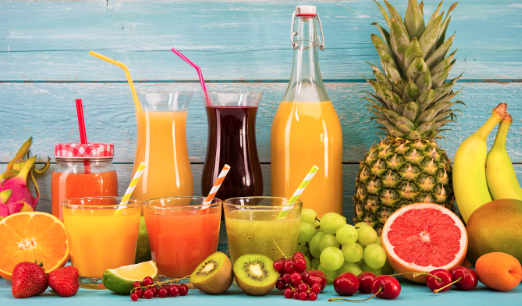Does juicer speed really matter? Well, sort of but perhaps not in the way you might have been led to believe. Especially if you’ve read some of the nonsense that we see masquerading as facts on some competitor websites. We prefer to take a rational look at the relevance of juicer speed and make sure we don’t insult our customers with the kind of unsupportable fibs published on other juicer sites.

What is the difference between slow and fast juicer?
Juicing is the latest craze that is sweeping the health world. The options we have now as consumers for juicing can be confusing, there are slow juicers, cold press juicers, masticating juicers, fast juicers, centrifugal juicers, and even various blenders that will get the job done. As a health-conscious person trying to get into juicing the options can lead you to be slightly overwhelmed. At Uber Appliance, we decided to do the research for you and put together a brief guide on the different types of juicers to help you decide which one is the best for you and your needs.
Reasons to Juice
The biggest reasons to juice is that Juicing offers various health benefits including but not limited to, weight loss, clearer skin, better overall health, reduction in stress, and wellbeing. There are countless juicing diets out there that can help you detoxify your body helping you get rid of toxins that are stored in your digestive tract. When you rid your body of those toxins you can help improve your body’s digestion process which helps restore your energy and clear up any skin conditions. An added bonus to detoxifying your body is getting rid of excess waste in your intestines which can reduce your weight and help you feel less bloated. The overall result is increased energy and a body that is functioning at peak performance. When your body is functioning in optimal conditions and you are getting in your recommended vitamin levels on a daily basis your overall stress will be reduced.
Fast Juicers AKA centrifugal juicers
Fast Juicers are by far the most popular type of juicer on the market today. The way the fast juicer works is it has a fast rotating centrifugal mesh that breaks down fruits, vegetables, and some greens into a large quantity of juice for your enjoyment. The pulp from the juice is automatically dumped in a separate pulp container for fast and easy cleaning.
Fast Juicers Advantages
The reason behind the centrifugal Juicers popularity is its fast juicing speed, its ability to produce a large quantity of juice via breaking down a majority of the cells in the fruits and vegetables you juice, its ease of cleaning, lower price point, and elimination of pulp for those that don’t like pulp. The ability to quickly and efficiently juice a large number of fruits and vegetables allows you to get in all your FDA recommended daily fruit/vegetables in a quick and easy manner. Overall the fast Juicer is perfect for someone who is always on the go and doesn’t have much time to wait on a slow juicer, its ease of cleaning and low price point makes it perfect for anyone looking to get started in juicing.
Fast Juicer Disadvantages
As great as the fast juicers are there are some drawbacks when compared to slow juicers (AKA cold press juicers). The speed of the fast juicers comes at the cost of decibels; the fast juicers are a bit louder than slow juicers when in operation. The fast juicers also produce slightly more heat due to the fast spinning mesh blade. Due to the heat generated you will have a more foamy juice that separates more easily, this is easily solved by shaking the juice and allowing it to re-group. One disadvantage that is highly debatable is the quality of nutrients you extract from a fast juicer as well as the quality of the juice itself, some users claim a lower quality of nutrient and juice from fast juicers, and this has not been verified in a scientific manner so take that with a grain of salt.
Slow Juicers AKA Cold Press Juicers
The slow Juicers are the new kids on the block when it comes to Juicers. The slow Juicers /Cold Press Juicers are not as popular as the fast juicers due to their higher price point, slower juice time, and slightly lower quantity of juice produced. Slow Juicers operate via crushing the fruit/vegetables into juice. The slow juicers produce more pulp thus giving slightly more nutrient content in the juice and do not produce as much heat as a fast juicer due to its slow operation. Generally speaking, slow juicers have more components making it harder to clean than a fast juicer, the hard work that goes into cleaning the unit pays off in slightly more nutrients and a slightly higher quality of juice with plenty of pulp for those that enjoy a pulpy juice with little to no foam. Where the cold press juicer excels is in its ability to process leafy greens, sprouts, kale, herbs, and grasses. The slow juicers are perfect for those who are particular about extracting the maximum nutrients from the juice and don’t mind the extra time in juice processing and cleaning. The higher initial cost can also deter some beginners from going with a slow juicer.
Slow Juicer Advantages
Slow Juicers offer various advantages that a fast juicer can’t compete on. The biggest advantage of a slow juicer is its ability to process leafy greens like mint, kale, sprouts, wheatgrass, and other herbs. The slow crushing action helps extract the maximum nutrients from the vegetables, fruits, and leafy greens input into the machine. Some claim that the cold press juicer offers a higher quality juice due to its pulp, and extra nutrients. The slow juicer is much quieter than its fast juicing counterpart.
Slow Juicer Disadvantages:
The slow juicers do not come with a pulp dumping mechanism causing the excess pulp that does not go into the juice container to remain stuck in the machine, this leads to a more difficult cleaning process. The slow juicer can take as much as 3 times longer to produce the juice making it in-efficient for people on the go, it definitely takes more dedication to wait on your juice and clean the machine after you are done juicing. The biggest barrier of entry is the higher initial cost, some slow juicers can be as much as 2 or 3 times more expensive than a fast juicer.
Final Thoughts
Both Fast Juicers and Slow Juicers have their advantages and disadvantages. The fast Juicer machine is perfect for those that are getting started with juicing and want a low barrier of entry into the wonderful world of juicing. The fast juicer comes in at a lower price point, are much more efficient, easier to clean, and have few disadvantages when compared to slow juicers. The slow juicers are for those that are really interested in adding leafy greens to their juice want the maximum nutrient content from the juice and don’t mind the higher cost and generally higher maintenance that comes with using a slow juicer.
